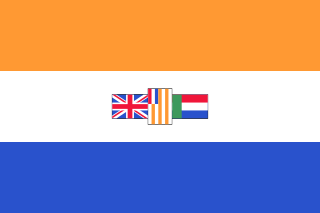
Namibia, officially the Republic of Namibia, is a country in Southern Africa. Its western border is the Atlantic Ocean; it shares land borders with Zambia and Angola to the north, Botswana to the east and South Africa to the south and east. Although it does not border Zimbabwe, less than 200 metres of the Zambezi River separates the two countries. Namibia gained independence from South Africa on 21 March 1990, following the Namibian War of Independence. Its capital and largest city is Windhoek. Namibia is a member state of the United Nations (UN), the Southern African Development Community (SADC), the African Union (AU) and the Commonwealth of Nations.

South West Africa was the name for modern-day Namibia when it was under South African administration, from 1915 to 1990.
The history of Namibia has passed through several distinct stages from being colonised in the late nineteenth century to Namibia's independence on 21 March 1990.

The Caprivi Strip, also known simply as Caprivi, is a geographic salient protruding from the north-eastern corner of Namibia. It is surrounded by Botswana to the south and Angola and Zambia to the north. Namibia, Botswana and Zambia meet at a single point at the eastern tip of the Strip, which also comes within 100 m of Zimbabwe. The territory was acquired by the then German South West Africa in order to provide access to the Zambezi River and consequently a route to the east coast of the continent and German East Africa. The route was later found not to be navigable because about 40 miles east of the Caprivi Strip is Victoria Falls, the world's largest waterfall.
Liberalism in South Africa was not formally organised until 1953, although there was some liberal tradition in parties present at the time. This changed in 1953 with the formation of the anti-Apartheid Liberal Party of South Africa, which was multi-racial. A second liberal tradition started in 1959 with the forming of the Progressive Party.
Katuutire Kaura is a Namibian politician. He was President of the Democratic Turnhalle Alliance (DTA) from 1998 to 2013 and was the official Leader of the Opposition from 2000 to 2005.

Katima Mulilo or simply Katima is the capital of the Zambezi Region in Namibia. It is located in the Caprivi Strip. It had 28,362 inhabitants in 2010, and comprises two electoral constituencies, Katima Mulilo Rural and Katima Mulilo Urban. It is located on the national road B8 on the banks of the Zambezi River in lush riverine vegetation with tropical birds and monkeys. The town receives an annual average rainfall of 654 millimetres (25.7 in).

The Popular Democratic Movement (PDM), formerly the Democratic Turnhalle Alliance (DTA), is an amalgamation of political parties in Namibia, registered as one singular party for representation purposes. In coalition with the United Democratic Front, it formed the official opposition in Parliament until the parliamentary elections in 2009. The party currently holds 16 seats in the Namibian National Assembly and one seat in the Namibian National Council and is the official opposition. McHenry Venaani is president of the PDM.
The United Democratic Front (UDF) is a political party in Namibia. Justus ǁGaroëb founded the party in 1989 and led it until 2013. He was succeeded by Apius Auchab.

The Caprivi Alliance Party was a political party in Namibia. In September 1985, the party merged into the United Democratic Party.

The Democratic Party for a New Society is a registered political party in Myanmar (Burma), founded in 1988 by Moe Thee Zun, the then Secretary General of the All Burma Students League (ABSL). The party campaigns independently from other parties and is unaffiliated with the more influential National League for Democracy (NLD), despite sharing similar goals.

The Caprivi conflict was an armed conflict between the Namibian government and the Caprivi Liberation Army, a rebel group that waged a brief insurrection in 1999 for the secession of the Caprivi Strip.

Albert Mishake Muyongo is a Namibian politician and former Member of Parliament who is currently living in exile in Denmark.
Caprivi Liberation Army (CLA) is a Namibian rebel and separatist group which was established in 1994 to separate the Caprivi Strip, a region mainly inhabited by the Lozi people. It operates only in the Caprivi strip.
The following lists events that happened during 2008 in Namibia.

The Turnhalle Constitutional Conference was a controversial conference held in Windhoek between 1975 and 1977, tasked with the development of a constitution for a self-governed Namibia under South African control. Sponsored by the South African government, the Turnhalle Conference laid the framework for the government of South West Africa from 1977 to independence in 1989.
The Federal Convention of Namibia (FCN) was a political party based in Rehoboth, Namibia. It was created in the wake of Namibian independence in 1988 by a merger of several smaller parties and gained a seat in the Namibian Constituent Assembly. After also-ran results in 1994 and 1999 it ceased to be publicly active.
The Caprivi treason trial is a trial in which the Government of Namibia indicted 132 people for allegedly participating in the Caprivi conflict on the side of the Caprivi Liberation Army during a period between 1992 and 2002. They were charged with high treason, murder, sedition, and many other offences, altogether 278 counts of criminal conduct.
The National Patriotic Front is a political party in Namibia.










